Putin signs law suspending INF treaty with US
Russian President Vladimir Putin has signed a law suspending the Cold War-era INF Treaty. Putin announced in February that he would halt participation in the treaty after Washington's abrupt decision to pull out of the agreement.
The Trump administration announced last October that the US would pull out of the treaty which has been a cornerstone of European security since its signing in 1987. Moscow later promised a "mirror response" to the decision and said it would suspend its own participation.
The treaty eliminated nuclear and conventional ground-launched ballistic and cruise missiles with ranges of 500 to 5,500 kilometers. Both sides have repeatedly accused each other of violating its terms.
Abandoning the deal, Trump said the US would "terminate the agreement" and then "develop the weapons." Putin later said Russia would be forced to "do the same thing."
Trump floated the idea of signing a "new nuclear agreement" with Russia after an hour-long phone call with Putin in May. The White House said at the time that a new deal could either be a new multilateral accord between the US, Russia and China — or the extension of the current US-Russia strategic nuclear accord.
Washington and Moscow are working to organize a meeting between Russian Deputy Foreign Minister Sergey Ryabkov and US Under-Secretary of State Andrea Thompson to discuss issues of strategic security, according to reports from Russian media.
Arms control was a top concern when Trump and Putin met last week at the G20 Summit in Japan, where the two leaders promised to continue dialogue on strategic stability.
NATO defense ministers will hold talks on Wednesday over their next move if Russia doesn't destroy a new missile system that could allow for short-notice nuclear attacks throughout Europe, which the United States has said violates the 1987 Intermediate-range Nuclear Forces Treaty (INF), according to Reuters.
Pentagon officials announced plans this week to move forward with flight tests of two medium to long range missile types previously banned under the Reagan era Intermediate-Range Nuclear Forces Treaty (INF) which both Washington and Moscow recently declared they have effectively pulled out of. The tests of the long-banned ground-launched cruise missiles would mark an ultimate point of no return for the fast faltering landmark 1987 treaty.
On Monday, Russian President Vladimir Putin issued a decree which suspended Russian participation in the Intermediate Nuclear Forces (INF) Treaty. The decision came after the US announced their intention to withdraw from the same treaty earlier this year.
Russia has formally pulled out of the Intermediate-Range Nuclear Forces Treaty (INF) after previously signalling that it would take this historic step after the White House announced last month that the US would suspend all obligations under the treaty. President Vladimir Putin signed a decree on Monday formally enacting and finalizing Russia’s suspension of the INF Treaty, which was set to expire in less than six months and subject of heightened tensions after both sides have repeatedly accused the other of having been in violation of its terms for years.
The United States called on Russia on Monday to destroy a new cruise missile system which it said was a “direct and continuing violation” of the Intermediate-range Nuclear Forces (INF) Treaty, and accused Moscow of destabilizing global security. Robert Wood, U.S. disarmament ambassador, said the system was capable of carrying both conventional and nuclear warheads and represented a “potent and direct threat to Europe and Asia” as it had a range of 500 to 1,500 kilometers (310-620 miles).



